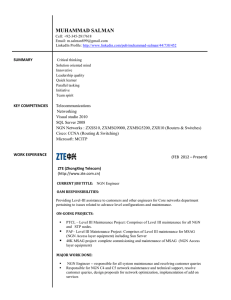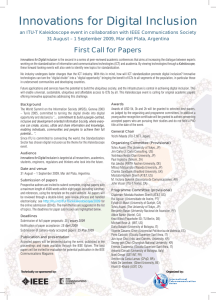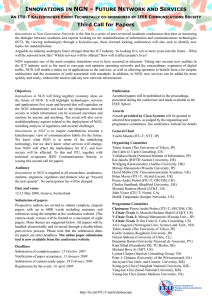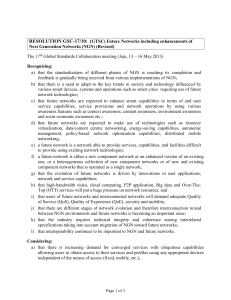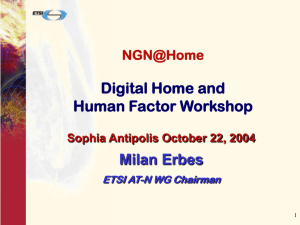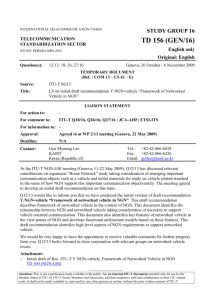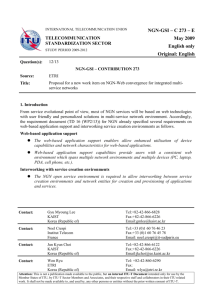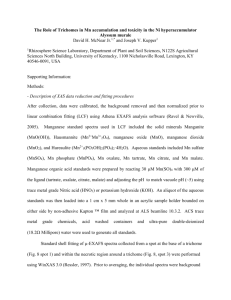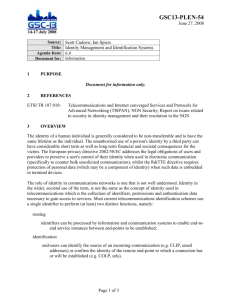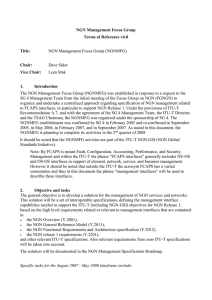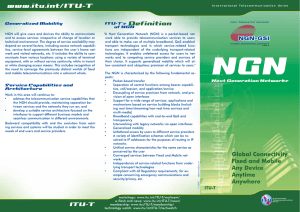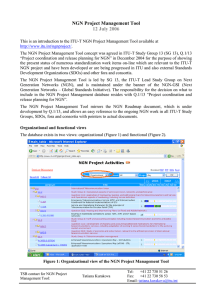I NGN – F
advertisement
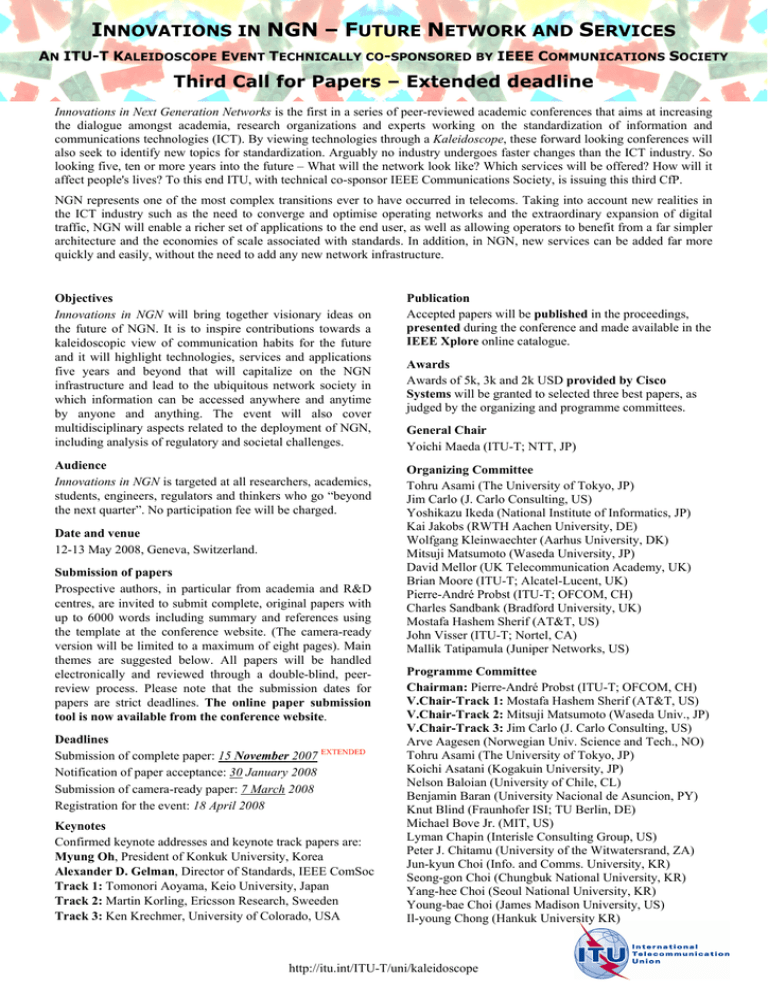
INNOVATIONS IN NGN – FUTURE NETWORK AND SERVICES AN ITU-T KALEIDOSCOPE EVENT TECHNICALLY CO-SPONSORED BY IEEE COMMUNICATIONS SOCIETY Third Call for Papers – Extended deadline Innovations in Next Generation Networks is the first in a series of peer-reviewed academic conferences that aims at increasing the dialogue amongst academia, research organizations and experts working on the standardization of information and communications technologies (ICT). By viewing technologies through a Kaleidoscope, these forward looking conferences will also seek to identify new topics for standardization. Arguably no industry undergoes faster changes than the ICT industry. So looking five, ten or more years into the future – What will the network look like? Which services will be offered? How will it affect people's lives? To this end ITU, with technical co-sponsor IEEE Communications Society, is issuing this third CfP. NGN represents one of the most complex transitions ever to have occurred in telecoms. Taking into account new realities in the ICT industry such as the need to converge and optimise operating networks and the extraordinary expansion of digital traffic, NGN will enable a richer set of applications to the end user, as well as allowing operators to benefit from a far simpler architecture and the economies of scale associated with standards. In addition, in NGN, new services can be added far more quickly and easily, without the need to add any new network infrastructure. Objectives Innovations in NGN will bring together visionary ideas on the future of NGN. It is to inspire contributions towards a kaleidoscopic view of communication habits for the future and it will highlight technologies, services and applications five years and beyond that will capitalize on the NGN infrastructure and lead to the ubiquitous network society in which information can be accessed anywhere and anytime by anyone and anything. The event will also cover multidisciplinary aspects related to the deployment of NGN, including analysis of regulatory and societal challenges. Publication Accepted papers will be published in the proceedings, presented during the conference and made available in the IEEE Xplore online catalogue. Audience Innovations in NGN is targeted at all researchers, academics, students, engineers, regulators and thinkers who go “beyond the next quarter”. No participation fee will be charged. Organizing Committee Tohru Asami (The University of Tokyo, JP) Jim Carlo (J. Carlo Consulting, US) Yoshikazu Ikeda (National Institute of Informatics, JP) Kai Jakobs (RWTH Aachen University, DE) Wolfgang Kleinwaechter (Aarhus University, DK) Mitsuji Matsumoto (Waseda University, JP) David Mellor (UK Telecommunication Academy, UK) Brian Moore (ITU-T; Alcatel-Lucent, UK) Pierre-André Probst (ITU-T; OFCOM, CH) Charles Sandbank (Bradford University, UK) Mostafa Hashem Sherif (AT&T, US) John Visser (ITU-T; Nortel, CA) Mallik Tatipamula (Juniper Networks, US) Date and venue 12-13 May 2008, Geneva, Switzerland. Submission of papers Prospective authors, in particular from academia and R&D centres, are invited to submit complete, original papers with up to 6000 words including summary and references using the template at the conference website. (The camera-ready version will be limited to a maximum of eight pages). Main themes are suggested below. All papers will be handled electronically and reviewed through a double-blind, peerreview process. Please note that the submission dates for papers are strict deadlines. The online paper submission tool is now available from the conference website. Deadlines Submission of complete paper: 15 November 2007 EXTENDED Notification of paper acceptance: 30 January 2008 Submission of camera-ready paper: 7 March 2008 Registration for the event: 18 April 2008 Keynotes Confirmed keynote addresses and keynote track papers are: Myung Oh, President of Konkuk University, Korea Alexander D. Gelman, Director of Standards, IEEE ComSoc Track 1: Tomonori Aoyama, Keio University, Japan Track 2: Martin Korling, Ericsson Research, Sweeden Track 3: Ken Krechmer, University of Colorado, USA Awards Awards of 5k, 3k and 2k USD provided by Cisco Systems will be granted to selected three best papers, as judged by the organizing and programme committees. General Chair Yoichi Maeda (ITU-T; NTT, JP) Programme Committee Chairman: Pierre-André Probst (ITU-T; OFCOM, CH) V.Chair-Track 1: Mostafa Hashem Sherif (AT&T, US) V.Chair-Track 2: Mitsuji Matsumoto (Waseda Univ., JP) V.Chair-Track 3: Jim Carlo (J. Carlo Consulting, US) Arve Aagesen (Norwegian Univ. Science and Tech., NO) Tohru Asami (The University of Tokyo, JP) Koichi Asatani (Kogakuin University, JP) Nelson Baloian (University of Chile, CL) Benjamin Baran (University Nacional de Asuncion, PY) Knut Blind (Fraunhofer ISI; TU Berlin, DE) Michael Bove Jr. (MIT, US) Lyman Chapin (Interisle Consulting Group, US) Peter J. Chitamu (University of the Witwatersrand, ZA) Jun-kyun Choi (Info. and Comms. University, KR) Seong-gon Choi (Chungbuk National University, KR) Yang-hee Choi (Seoul National University, KR) Young-bae Choi (James Madison University, US) Il-young Chong (Hankuk University KR) http://itu.int/ITU-T/uni/kaleidoscope Javier Diaz (Univ. Nacional de La Plata, AR) Vladimir Efimushkin (ZNIIS, RU) Tineke M. Egyedi (TU Delft, NL) Qi Feng (BUPT, CN) Vladislav V. Fomin (Montpellier Business School, FR) Wen Gao (Peking University, CN) Stephan Gauch (Fraunhofer ISI, DE) Adam Grzech (Politechnika Wrocławska, PL) Chris Guy (The University of Reading, UK) Guenter Haring (University of Vienna, AT) Wu Hequan (Chinese Academy of Engineering, CN) Yukio Hiramatsu (Osaka Institute of Technology, JP) Doan Hoang (University of Technology, Sydney,AU) Qiheng Hu (Chinese Academy of Sciences, CN) Yoshikazu Ikeda (National Institute of Informatics, JP) Villy Bæk Iversen (Technical University of Denmark, DK) Bijan Jabbari (George Mason University, US) Kai Jakobs (RWTH Aachen University, DE) Farouk Kamoun (University of Manouba, TN) Wolfgang Kleinwaechter (Aarhus University, DK) Nargis Khujanazarova (Tashkent University, UZ) Masafumi Koga (Oita-University, JP) Andrej Kos (University of Ljubljana, SI) Noboru Koshizuka (The University of Tokyo, JP) Ken Krechmer (University of Colorado, Boulder, US) Pieter Kritzinger (University of Cape Town, ZA) Hsiang-Tsung Kung (Harvard University, US) Chuang Lin (Tsinghua University, CN) Duo Liu (China Academy of Telecom Research, CN) Luigi Logrippo (Université du Québec - Outaouais, CA) Kalle Lyytinen (Case Western Reserve University, US) Petri Maehoenen (RWTH Aachen University) Thomas Magedanz (TU Berlin / FhG FOKUS, DE) Giovani Mancilla (Universidad Distrital, CO) Olli Martikainen (University of Oulu, FI) Lorne Mason (McGill University, CA) Reuven Meidan (Tel-Aviv University, IL) David Mellor (UK Telecommunications Academy, UK) Antonella Molinaro (U. Mediterranea of R.Calabria, IT) Jean-Yves Monfort (ITU-T; France Telecom, FR) Yong-jin Park (Hanyang University, KR) Jose Giovanny López Perafán (Unversidad del Cauca, CO) José Miguel Piquer Gardner (Universidad de Chile, CL) Iskra Popova (MidSweden University, SE) Louis Pouzin (Eurolinc, Fr) Ramjee Prasad (Aalborg University, DK) Ramon Puigjaner (Universitat de les Illes Balears, ES) Don Purcell (Catholic University, US) Peter Radford (LogicaCMG, UK) Sriram Raghavan (Intel Research, IN) Jungwoo Ryoo (Pennsylvania State University, US) Imad Al-Sabouni (Ministry of Communications, SY) Mary Saunders (NIST, US) Alwyn Seeds (University College London, UK) José Neuman de Souza (Federal University of Ceará, BR) Michael B. Spring (University of Pittsburgh, US) Tatsuya Suda (University of California, Irvine, US) Kenzo Takahashi (Fukui University, JP) Klaus Turowski (University Augsburg, DE) Hiromi Ueda (Tokyo University of Technology, JP) Yoshiyori Urano (Waseda University, JP) Laurent Vreck (ETSI, FR) Klaus Wehrle (RWTH Aachen University, DE) Vilas Wuwongse (Asian Institute of Technology, TH) Supported by: Ahmad Zaki (Universiti Teknologi Malaysia, MY) Huiling Zhao (CN Telecom Beijing Res. Institute, CN) Keywords Accessibility, NGN, object to object communication, applications, services, innovation, ICT, convergence, telecommunications, Internet Protocol, IPTV, USN (Ubiquitous Sensor Networks), security, standardization research, economics of standardization, ubiquitous societies, multimedia, interoperability, QoS, mobility, virtual communities, network operation. For additional information Additional info can be found at the event website: http://itu.int/ITU-T/uni/kaleidoscope. Inquiries should be addressed to kaleidoscope@itu.int. Suggested (non-exclusive) list of topics Track 1: NGN architecture evolution • Evolution of the NGN architecture • Open service interfaces, service interaction and interoperability in future scenarios • Interworking of advanced services between legacy networks and NGN • Seamless handover, multihoming and mobility • Converged multimedia emergency communications • Future packet-based, ultra-high speed transport networks • Advanced network security, network identification, biometrics, localization techniques and USN • Digital rights management • NGN and the next generation internet Track 2: Applications and services over the NGN • Enhancing telecoms accessibility for all • Broadcasting, multicasting, unicasting and peer-topeer in NGN: IPTV, Interactive TV, Mobile TV, and others • Guaranteed QoS in end-to-end, inter-provider real time multimedia services • Innovative multimedia applications and content delivery using all-IP converged fixed/mobile • Future virtual communities & social networking services • New programming models and service creation • Creative combinations of web and network services • Services and experiences using location, presence, context awareness and personalization • Advanced smart terminals • NGN-enabled public services e.g. telemedicine and distance learning Track 3: Social, economic and policy issues in the ubiquitous societies • Innovations in NGN to overcome the digital divide • Evolution of legislative and regulatory frameworks towards converged networks • Security and ubiquity: what's the right balance? • NGN standardization: stifle or encourage innovation? • Business models for the information society (including accounting, billing and charging) • Analysis of NGN standardization processes • Economics of NGN standardization • Societal impact of NGN and of virtual, collaborative environments Technically co-sponsored by:
